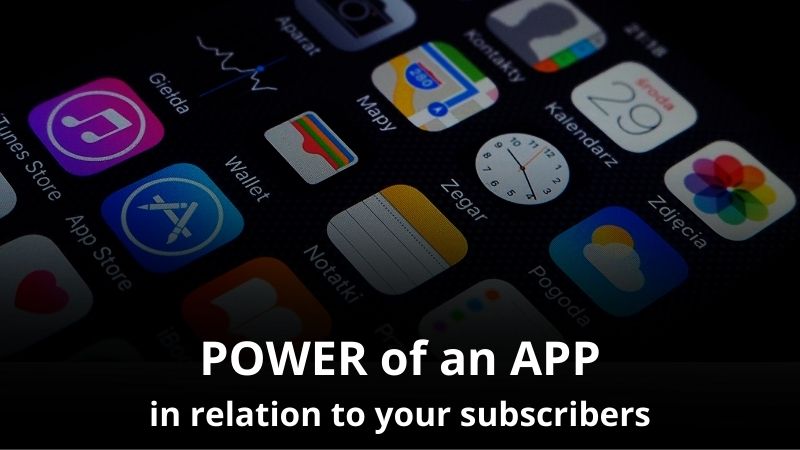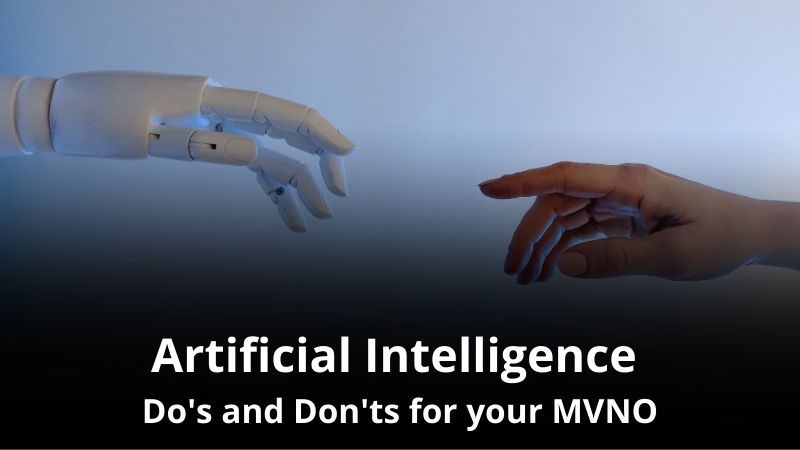What are the Pros and Cons of AI for the Subscribers and the MVNO?
Artificial Intelligence (AI) offers numerous Pros and Cons for both subscribers and the MVNO. However it also introduces challenges and considerations, such as privacy concerns, algorithmic biases, and upfront implementation costs. In short successful deployment of AI in the mobile industry requires a careful balance between maximizing advantages and mitigating potential drawbacks.
What do you need to know about the Pros & Cons of AI
1. What are the pros and cons of AI for the subscribers?
• Pros of AI for Subscribers
• Cons of AI for Subscribers
2. What are the pros and cons of AI for the MVNO?
• Pros of AI for MVNOs
• Cons of AI for MVNOs
3. Summary
• Summary for Subscribers
• Summary for MVNOs
• Summary Overall
When using Artificial Intelligence what are the Pros & Cons for the Subscribers?
Subscribers Pros when using AI
Personalized Experiences
AI enables mobile brands and MVNOs to deliver personalized services, such as tailored content recommendations, promotions, and pricing plans, enhancing the overall subscriber experience.
Dynamic Pricing and Cost Optimization
AI-driven dynamic pricing allows for personalized plans based on individual usage patterns, optimizing costs for subscribers and providing them with more relevant and cost-effective service plans.
Enhanced Security
AI plays a crucial role in detecting and preventing fraudulent activities, safeguarding subscriber accounts and personal information, contributing to a more secure mobile experience.

Efficient Customer Support
AI-powered chatbots and virtual assistants provide instant and efficient customer support, addressing queries, resolving issues, and improving communication between subscribers and the MVNO. For example with an Mobile APP.
Improved Network Performance
AI algorithms contribute to the optimization of mobile networks, ensuring consistent quality of service, proactive issue resolution, and efficient resource allocation, leading to better connectivity for subscribers.
Subscribers Cons when using AI

Algorithmic Bias
AI systems may exhibit biases, leading to unequal treatment of different subscriber groups. As a result tis bias can impact personalized recommendations, pricing, and other AI-driven services, potentially causing dissatisfaction.
Overreliance on Automation
While AI-driven automation streamlines processes, an overreliance on these systems may lead to reduced human interaction.
For sure (some) subscribers might prefer human assistance in certain situations, and an overemphasis on automation could result in a less empathetic customer experience.
Privacy Concerns
The use of AI, especially in personalized services, raises privacy concerns as it involves the analysis of user data. For example subscribers may be apprehensive about the collection and use of their personal information.
What are the Pros and Cons of Artificial Intelligence (AI) for the MVNO?
MVNO Pros when using Artificial Intelligence
Operational Efficiency
AI-driven automation improves operational efficiency for MVNOs, reducing manual workloads, optimizing processes, and enabling more effective resource allocation.
Predictive Analytics for Business Strategy
MVNOs can leverage predictive analytics to anticipate subscriber needs, forecast market trends, and strategically plan offerings, ensuring they stay competitive and responsive to market demands.
Network Optimization
AI algorithms can optimize network performance, leading to enhanced quality of service for subscribers and reducing the need for reactive issue resolution.

Innovative Offerings
AI enables MVNOs to develop innovative offerings, such as dynamic pricing, personalized plans, and value-added services, giving them a competitive edge in the market.
Cost Optimization
AI can contribute to cost optimization by streamlining processes, automating routine tasks, and enhancing overall operational efficiency, allowing MVNOs to allocate resources more effectively.
MVNO Pros when using Artificial Intelligence
Implementation Costs
Implementing AI technologies requires initial investments in infrastructure, training, and integration. As a result MVNOs may face challenges in terms of upfront costs and the need for skilled professionals.
Integration Challenges
Integrating AI systems with existing MVNO infrastructure can be complex. In addition compatibility issues and the need for seamless integration may pose challenges during the implementation phase.
Algorithm Complexity
The complexity of AI algorithms may pose challenges in terms of understanding, interpretability, and control. Thus ensuring transparency in algorithmic decision-making is crucial to maintain trust with subscribers and regulatory compliance.

Data Security Concerns
The handling of sensitive subscriber data in AI processes poses security risks. Therefore MVNOs must implement robust security measures to protect subscriber information from potential breaches or unauthorized access.
Summary
Summary for Subscribers
AI offers the potential for a more personalized and convenient mobile experience. AI can tailor data plans, recommend suitable services, and proactively address network issues. Additionally, AI-powered chatbots can provide efficient customer support, and AI-driven security features can protect subscribers from fraud and malware. However, it is important to be aware of the potential for algorithmic bias, which could result in unfair treatment for certain subscriber groups. Furthermore, an overreliance on automation could lead to impersonal interactions and a decline in human customer service. Finally, the use of AI in subscriber data analysis raises privacy concerns, and subscribers should be assured that their data is handled responsibly.
Summary for MVNOs
AI presents a powerful tool to optimize operations and gain a competitive edge. AI can automate tasks, streamline network management, and predict customer churn, enabling MVNOs to proactively address customer needs. Additionally, AI can be used to develop innovative service offerings and optimize pricing strategies. However, MVNOs must also consider the implementation costs associated with AI, as well as the challenges of integrating AI systems with existing infrastructure. The complexity of AI algorithms necessitates a skilled workforce to develop, maintain, and interpret these systems. Finally, MVNOs must prioritize data security to ensure that subscriber data is protected from unauthorized access.
Summary Overall
In conclusion, while Artificial Intelligence (AI) presents a range of opportunities for both mobile virtual network operators (MVNOs) and their subscribers, it also necessitates careful consideration of potential drawbacks. AI holds immense potential to transform the mobile industry, but both MVNOs and subscribers should approach this technology with a cautious optimism. By acknowledging the potential drawbacks and implementing AI responsibly, both groups can leverage its power to create a mutually beneficial future.
Here are some additional points to consider:
- Regulation: As AI continues to develop, regulatory frameworks will need to be established to address issues such as bias, transparency, and data privacy.
- Transparency: MVNOs should be transparent about their use of AI and provide subscribers with clear information about how their data is collected and used.
- Education: Educating subscribers about AI can help to alleviate concerns and foster trust.
By embracing these considerations, MVNOs and subscribers can work together to ensure that AI is a force for positive change in the mobile industry.







